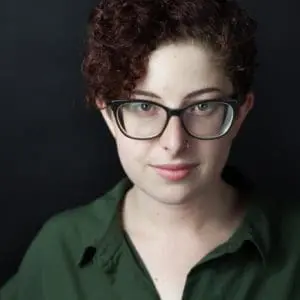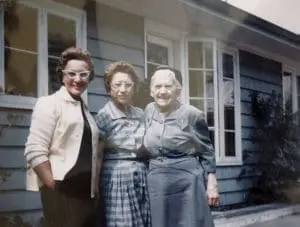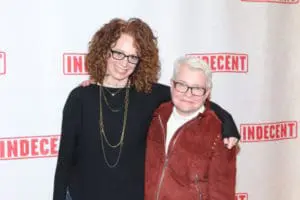Heritage and Theatre: APA Shira Reflects on Indecent

By Shira Gitlin
When I was young, my family would drive from our home in the center of the country to visit my paternal grandparents in California. The minute we arrived, I would run inside to meet my grandfather, asking a million questions a minute, and he would laugh and say “Gey klop kop af vant” I rolled the words around in my mouth, not knowing what they meant. “a shandeh far di kinderle” my mother would chide. I would chase my sisters around repeating my grandfather’s words, not knowing that it meant “go bang your head against the wall”. Their house was a blend of English, Spanish, and a language I was not familiar with at all: Yiddish.
Yiddish is the language spoken predominantly by Ashkenazi Jews, of which both sides of my family descend. It is largely based in German grammar and vocabulary mixed with Hebrew, Aramaic, Slavic, and other ancient romance languages. It is also almost completely extinct. In the years before World War II, there were roughly 13 million Yiddish speakers. Now there are almost none. It was only recently that I learned that my grandfather, who emigrated from Argentina in 1957, spoke Yiddish first, then Spanish, and finally English. On my mother’s side in New England, phrases like shmutz (dirt), meshugganah (crazy), or chutzpah (nerve) were commonplace in conversation. Many have even become part of the common American vernacular.
Yiddish did not return to me until the summer of 2017. I had just graduated from college and was working for a theatre company in New York City. While I had seen my fair share of Fiddler on the Roof productions, my knowledge of Yiddish theatre – theatre by, for, or about Jews – was extremely limited. I met a friend who worked for the National Yiddish Theatre-Folksbiene. She asked if I had heard of Indecent, Paula Vogel’s new play. I had not, but she encouraged me to grab a ticket before the run ended. I had no idea that what I was about to experience would resonate with every fiber of my being.
Indecent is a play with music that covers the rise (and fall) of the first Yiddish play to come to Broadway, Sholem Asch’s God of Vengeance. It was there, sitting in the Cort Theater, that the words “This is what it means to be Jewish in America” washed over me. I sat enthralled for the entire hour and 45 minutes, chills running down my skin. I was reminded of my great-grandfather, who had traveled on a ship to Ellis Island in 1911, just a few years before the troupe sat in that same very long line. I was reminded of my great-grandmother, who would never talk about her family she left behind, their memories erased by ash and dust. And when one actress cries out, “This will be the only role in my lifetime where I could tell someone I love that I love her onstage” I felt like I had witnessed a history of myself.

My Great Grandmother, Celia, center
My connections to Indecent go deeper than the text alone. The women who tell the story are equally as important as the subject. Paula Vogel, in fact, has impacted my theatrical journey practically from the beginning. The first show I worked on in college was How I Learned to Drive, Vogel’s 1998 Pulitzer Prize-winning drama. Her perspectives were new and different, gritty and real. It was only later on that I realized Vogel and I share intersecting identities as gay, Jewish theatre-makers. Indecent wasn’t just written by Vogel however – it was a co-creation with director Rebecca Taichman, based on Traichman’s directing thesis at Yale. Being a director is hard. Being a female director in the commercial world of Broadway, where only six women have won the Tony Award for Best Direction in a Play (Taichman was the sixth in 2017 for her work on Indecent), is harder. As a young emerging director, I am inspired by the work of Traichman and other female directors such as Rachel Chavkin (Natasha, Pierre, and the Great Comet of 1812, Hadestown) and our own production’s director, Rebecca Wright, who has done incredible work with Philadelphia-based Applied Mechanics.

Rebecca Taichman and Paula Vogel
Indecent is a rare piece of theatre that simultaneously documents and creates. Fictional narratives are weaving through real figures of theatre history. The choice to use Yiddish subtitles in Indecent is powerful; the Yiddish language and culture was devastated by the effects of the Holocaust, but also by the active assimilation of American Jews, who pulled away from speaking Yiddish to escape rampant anti-Semitism. A powerful moment in the play comes when two Yiddish-speaking actresses attempt to learn the script in English. Reina cannot escape the harsh Yiddish vowel tones and is recast in the play. The idea that one must leave behind their identity in order to exist in a new world is heartbreaking. At the same time, I know that my own family faced that same struggle upon immigration and all that’s left over is the occasional “oy vey”.
While the language itself has all but died out, Yiddish theatre is slowly returning to New York stages. The Nation Yiddish Theatre Folksbiene, founded in 1915, is still producing work, including a well-received Yiddish version of Fiddler on the Roof at Stage 42, one of the largest off-Broadway theatres. In late 2016, New Yiddish Rep staged Sholem Asch’s God of Vengeance, just before Indecent transferred to Broadway. While Yiddish is no longer spoken regularly, it is clear that it has left an impact on American audiences.
Shira Gitlin is a member of Arden Professional Apprentice Class 26.
Indecent is onstage now thru June 23, 2019.
